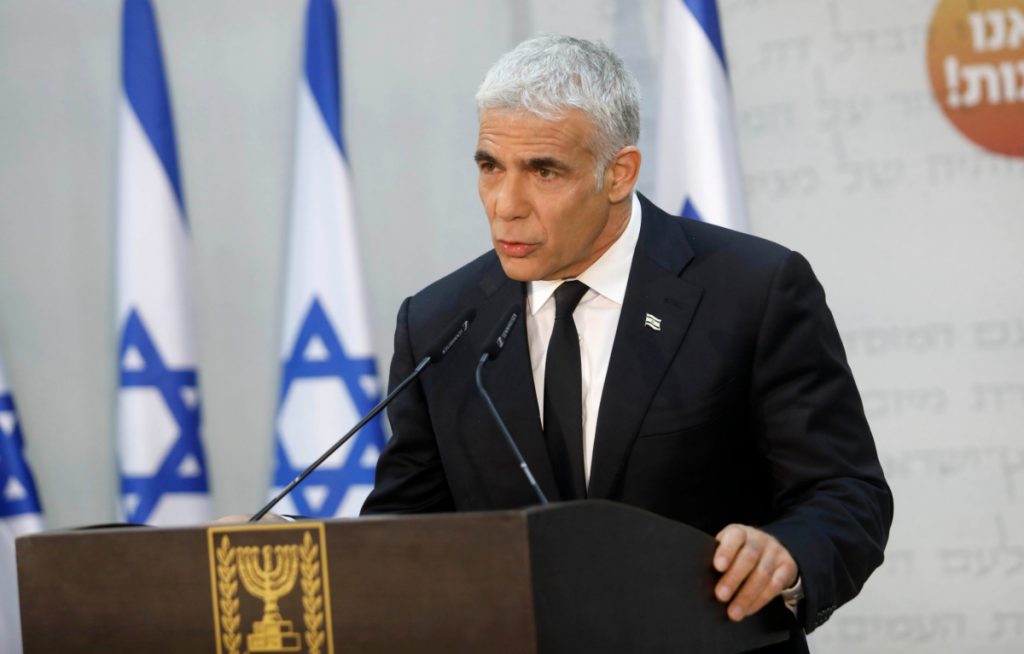Australia/Israel Review
Who is Yair Lapid, Israel’s likely new interim PM?
Jun 29, 2022 | AIJAC staff

Yair Lapid, the chairman of the Yesh Atid (“there is a future”) party, will take over as interim Israeli Prime Minister from Naftali Bennett if the Knesset votes to dissolve itself in the final weeks of June as expected.
This is in keeping with the provisions of the coalition agreements signed last year that created the now outgoing eight-party government. Under these agreements, Lapid was originally slated to take over as PM from Bennett in August 2023, and serve as the Minister of Foreign Affairs and “Alternate Prime Minister” – with the right to veto any government decision – until then. However, the agreement also contained a clause stating that in the event of Government collapse caused by the withdrawal of support from within one of the parties in Bennett’s “bloc”, as happened in this case, Lapid is to become interim PM pending fresh elections.
Lapid’s political career dates back to 2012, when he founded Yesh Atid with a secularist and centrist “clean government” platform. It quickly became the second biggest party in Israel’s Knesset in its first election in 2013, winning 19 seats. From 2013 to 2014, Yesh Atid joined a coalition government led by the Likud, with Lapid serving as Finance Minister under Prime Minister Binyamin Netanyahu. Netanyahu then fired Lapid for alleged disloyalty in December 2014, precipitating new elections in March 2015. Yesh Atid declined to 11 seats and went into opposition.
In the elections held in April 2019, September 2019 and March 2020, Yesh Atid ran as part of a coalition of parties calling itself “Blue and White”, dedicated to replacing Netanyahu, who was by then under indictment on corruption charges. Lapid agreed to be second-in-command to former IDF Chief of Staff Benny Gantz in Blue and White, with an agreement that the two would rotate the prime ministership should they win government. Blue and White won more than 33 seats in each of those elections, and effectively held the Likud to a draw in all of them. In May 2020, Gantz reached a deal to create a “national emergency government” with Netanyahu to deal with the COVID crisis. However, Lapid rejected this deal and split Blue and White, taking 17 of Blue and White’s 33 Knesset members into opposition and becoming Opposition Leader.
In the March 2021 election that followed the collapse of the Netanyahu-Gantz “emergency government”, Yesh Atid won 17 seats, again making it the second-largest party in the Knesset. Lapid was given a mandate to try to form a government by then-Israeli President Rivlin after Netanyahu failed to do so, and was the key player in negotiating the coalition arrangements that brought about the formation of the current Government.
His tenure as Foreign Minister over the past year has seen him gain a greater international profile. He has also achieved significant success in expanding Israeli ties with the UAE, Morocco, Bahrain, Egypt and Jordan in the wake of the 2020 Abraham Accords through a series of agreements and meetings. These culminated in the unprecedented Negev Summit in March, which saw Israel hosting the foreign ministers of the UAE, Bahrain, Morocco and Egypt, as well as US Secretary of State Antony Blinken.
Lapid was born in Israel in 1963 and is married with three children. He comes from a family with a history in journalism and politics. His father Yosef “Tommy” Lapid was an influential Israeli journalist-turned-politician who headed the secularist Shinui party. He held a seat in the Knesset from 1999-2006, serving as Deputy Prime Minister and Justice Minister from 2003-2004.
Before beginning his political career, Yair Lapid was one of Israel’s best-known TV journalists and the author of several books, including both novels and non-fiction.
In 2013, TIME Magazine ranked him as one of the 100 most influential people in the world.
Tags: Israel, Yair Lapid






